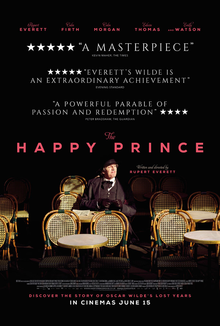
Usually when I add films to my list from critics’ lists of the most notable releases of the year, they usually have stellar aggregated ratings. So I was surprised to note that this has a relatively dismal rating in the low 70s on Rotten Tomatoes. I decided to watch it anyway as my wife has a weakness for biographies of writers and was pleasantly surprised by its lyrical quality and tight focus on the final years of Wilde’s life.
In 1895, Oscar Wilde is at the height of his fame as a playwright in London when he is embroiled in a sodomy trial and imprisoned for two years. He emerges a broken man and flees to France with the help of friends to live under a false name. However he is unable to keep away from Bosie, the son of the Marquess of Queensberry, who had caused him to be prosecuted. He escapes to Naples with Bosie, alienating his other friends in the process, especially Robbie Ross his literary executor who is also in love with Wilde and who has helped him the most after his release from prison. There Wilde and Bosie live a life of debauchery involving many other young men until they run out of money and their income from their respective families is cut off. Bosie then abandons Wilde and he returns destitute to France.
It strikes me as rare indeed for a film about a celebrity figure like Oscar Wilde to focus exclusively on the fading years of his life when he is at his lowest. This is nothing about his glory years and he writes nothing at all during the period covered in this film. Surprisingly there is nothing either about his trial and the scandal around it which was a huge deal in London at the time, all of it being briefly covered only in the foreword. This very much is all about his life after his fall from grace and how his poisonous relationship with Bosie seals his fate despite the advice of his family and friends and his own better judgment. This focus is especially curious given my understanding that it is a passion project of the director Rupert Everett who is openly gay and plays Wilde himself in this film. I would have expected such an ardent fan of Wilde to portray him in a better light and while the film is very clear that the state prosecution against him is wrong, the portrait of Wilde that emerges here is highly unflattering.
The film looks sumptuous and though Everett might be a little old to embody a man who died at the age of 46, he plays the role to perfection. Quotes from Wilde’s writings are used copiously to demonstrate his eloquence and how he effortlessly becomes the life of any party such when his friends organize a dinner with fans within the French literary circle. It’s wonderfully entertaining when Wilde breaks out in song and when the mother of a married young man he invites to his parties berates him, thinking that they are consorting with female prostitutes and not understanding what is happening at all. Yet the overall picture is very much negative one. He shamelessly begs for money and spends it on a luxurious life with Bosie. He claims to love yet all of his targets are good looking young men who are very much not his intellectual equals and have little in common with him. Thought the film is careful to show that he has no liaisons with underaged boys and he always pays them so that it is consensual, it is still hard to deny that he is very much a sexual predator.
The film ends with a note that Wilde was pardoned in 2017 along with many other gay men, but it’s really his relationship with Bosie that is the heart of this particular project. If only he had heeded the advice of his other friends and family, he might have come to a less ignominious end but as my wife notes, if he was the type to hold himself back then he wouldn’t have been a great artist in the first place.